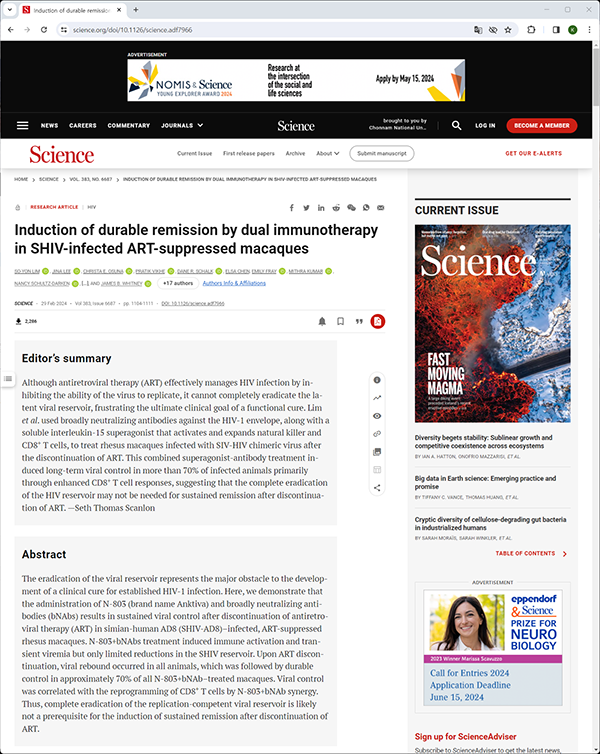
A graduate of CNU’s College of Veterinary Medicine has garnered attention by conducting AIDS-related research at Harvard Medical School, one of the world’s top institutions, and recently published a paper in the prestigious journal, Science.
Dr. Lee Jin-a graduated from CNU’s College of Veterinary Medicine in 2011 and completed her master’s and doctoral degrees (supervised by Professor Lee Bong-ju) at the same institution.
From 2016, she worked as a postdoctoral fellow at Massachusetts General Hospital, a teaching hospital affiliated with Harvard Medical School. In 2018, she began her postdoctoral research at the Lab of Professor James B. Whitney at the Harvard Medical School’s Department of Virology and Vaccine Research, initiating substantial research on AIDS.
To cure AIDS, complete eradication of HIV virus-infected T-lymphocytes within the body is necessary, but such treatment methods have not been developed yet.
HIV proliferates within infected immune cells as hosts. While most infected cells perish during the proliferation process, some survive in a dormant state with the HIV. The problem arises because the body’s immune cells cannot detect these dormant infected cells, making it impossible for natural clearance within the body or removal through antiretroviral drugs. If patients discontinue antiretroviral treatment, the dormant HIV within these cells becomes active, leading to virus proliferation and disease progression. Therefore, HIV-infected patients must take antiretroviral drugs for life.
HIV-related research is conducted using non-human primates such as rhesus macaques and models of simian immunodeficiency virus (SIV) or simian-human immunodeficiency virus (SHIV). Dr. Lee infected rhesus macaques with SHIV and administered antiretroviral drugs continuously for over a year, creating an animal model that replicates clinical symptoms and immune responses of chronic HIV infection.
Through this, Dr. Lee discovered that activation of CD8+ T-lymphocytes is essential for eliminating dormant HIV viruses. For this purpose, she focused on a substance called N-803, an IL-15-related immunomodulator.
Furthermore, Dr. Lee found that administering a broad neutralizing antibody that can neutralize HIV simultaneously is effective in eliminating the HIV. Administering N-803 and broad neutralizing antibodies together resulted in a decrease in the virus in approximately 70% of infected monkeys, eventually leading to complete disappearance.
In particular, as broad neutralizing antibodies attach to the surface of immune cells to form immune complexes, they can efficiently promote immune responses. Therefore, simultaneous administration of N-803 and broad neutralizing antibodies can enhance antiviral immune responses more effectively than administering N-803 alone.
This research was published in the March issue of the prestigious scientific journal Science. Furthermore, after completing her postdoctoral fellowship at Harvard Medical School, Dr. Lee moved to Boston College, where she continued her research as a senior researcher, leading a research group with Professor James B. Whitney, who was leading the group at Harvard.
Dr. Lee is currently conducting research applying N-803 and broad neutralizing antibodies to mRNA vaccine platforms, which have recently gained attention due to COVID-19, and further achievements are expected.